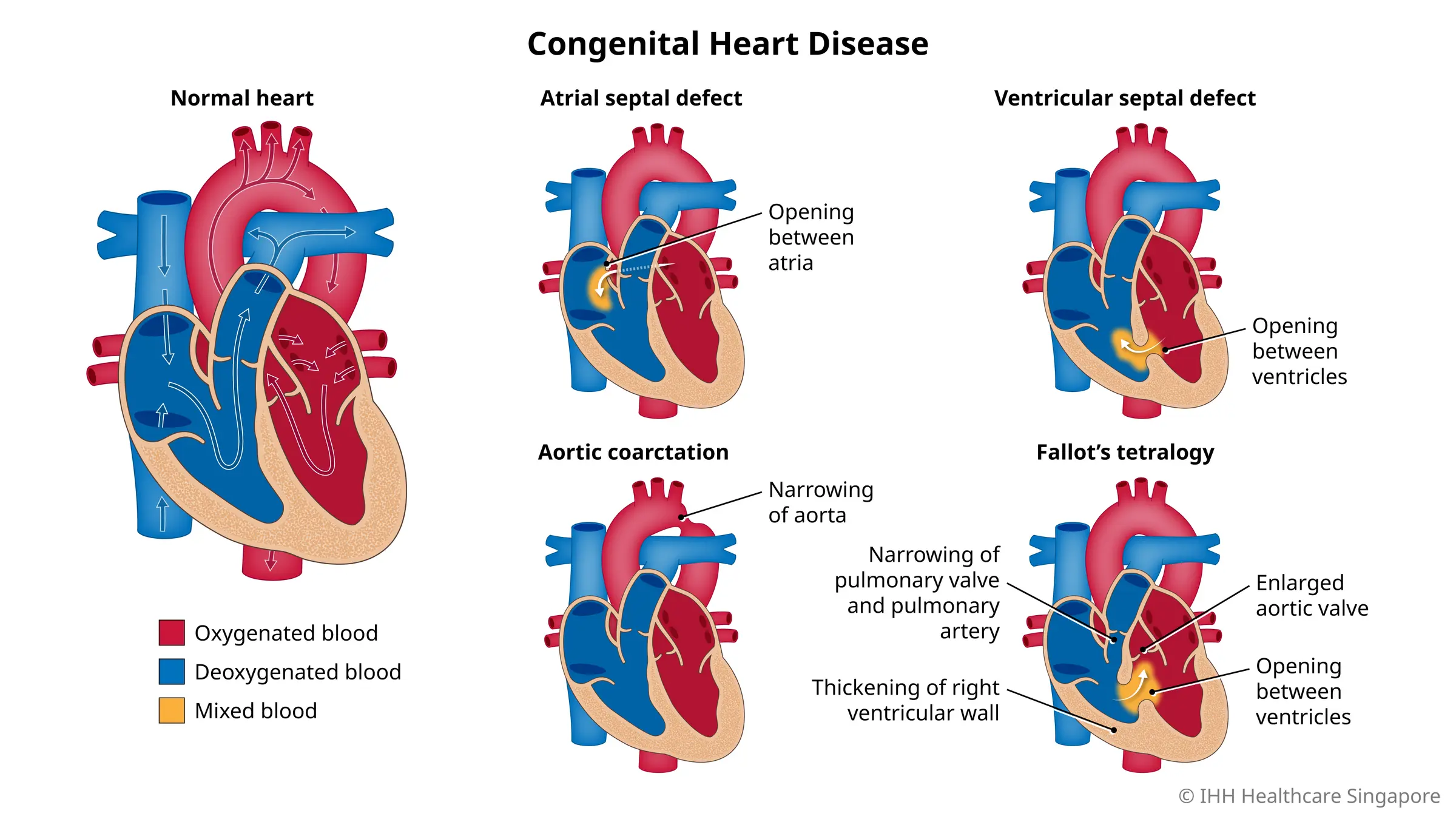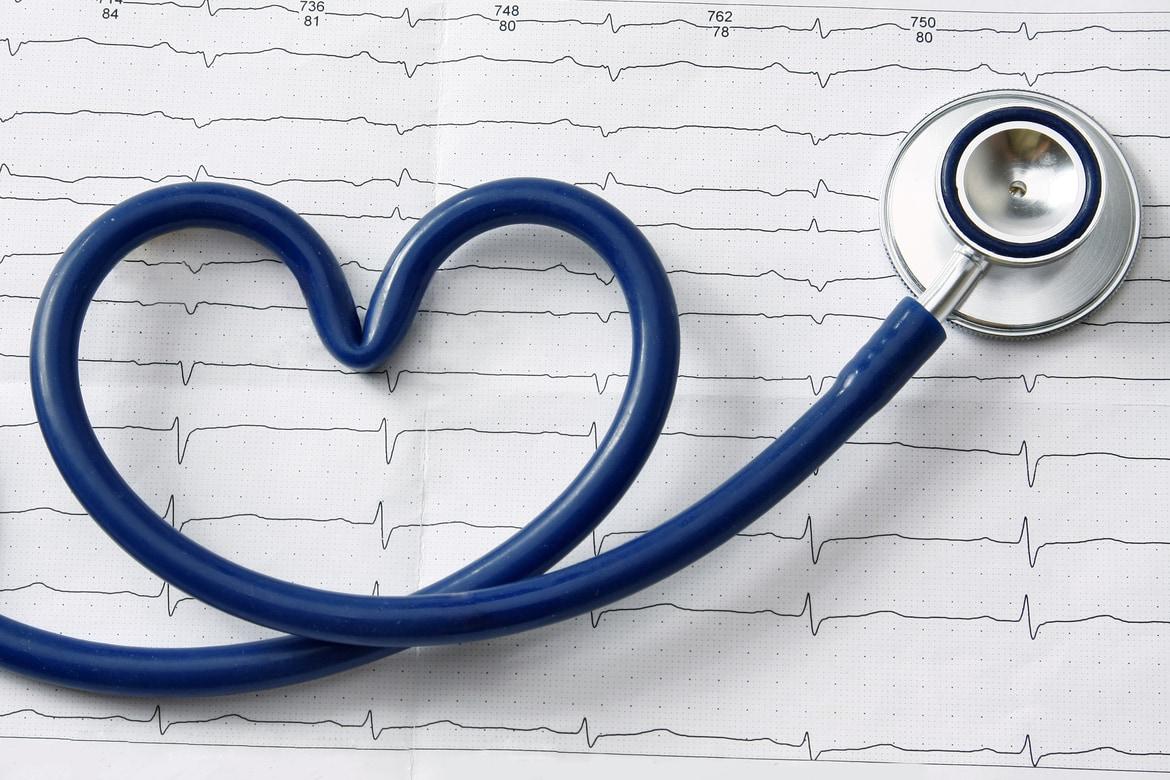-
-
Featured Care Areas

Chronic Heart Diseases
What is chronic heart disease?
Chronic heart disease is a type of cardiovascular disease that affects your heart function repeatedly and over time. Examples of chronic heart diseases include:
- Coronary artery disease (CAD)
- Congenital heart disease (CHD)
- Heart arrhythmia (irregular heartbeat)
- Heart muscle disease (cardiomyopathy)
- Pulmonary arterial hypertension
- Valvular heart disease
- Heart failure
What are the symptoms of chronic heart diseases?
The symptoms of chronic heart disease vary, depending on the type of heart disease you have.
Some individuals may not notice any symptoms until they have a heart attack or experience heart failure. To prevent, diagnose and treat heart disease early, you should attend health screenings regularly.
Symptoms of coronary artery disease (CAD)
CAD, also known as ischaemic heart disease, is the most common type of cardiovascular disease. It occurs when the heart does not receive enough blood and oxygen, and may not cause any noticeable symptoms until a serious cardiac event occurs. Men and women may experience CAD symptoms differently.
As plaque builds up in your coronary arteries, you may experience chest pain (angina) during exercise or under stress. Find out more about the symptoms of CAD.
Symptoms of congenital heart disease (CHD)
Heart defects that exist from birth are known as CHD. Many CHDs do not result in clear symptoms. However, serious or multiple CHD can cause symptoms such as blue skin, chest pain and fainting. Find out more about the symptoms of CHD.
Symptoms of heart arrhythmia (irregular heartbeat)
Your symptoms depend on whether you have an abnormally rapid heartbeat (tachycardia) or slow heartbeat (bradycardia).
Symptoms of an abnormally rapid heartbeat include breathlessness, dizziness, palpitations and lightheadedness. Symptoms of an abnormally slow heartbeat include chest pain, breathlessness, trouble concentrating and confusion. Find out more about the symptoms of heart arrhythmias.
Symptoms of heart failure
Heart failure is a serious condition which may lead to sudden death in a minority of individuals. Symptoms of heart failure include shortness of breath, fatigue, leg or abdominal swelling, or breathlessness when lying flat. Find out more about the symptoms of heart failure.
Symptoms of heart muscle disease (cardiomyopathy)
Cardiomyopathy is a heart muscle disease that can sometimes lead to heart failure and heart arrhythmia. Common symptoms of cardiomyopathy include:
- Extreme tiredness or fatigue
- Fainting or lightheadedness and dizziness
- Irregular heartbeat or palpitations
- Shortness of breath, even at rest
- Swelling in legs, ankles and feet
- Stomach bloating
Symptoms of pulmonary arterial hypertension
Pulmonary hypertension is a type of high blood pressure in the blood vessels leading from the heart to the lungs. In the early stages, you may not notice any symptoms. However, as the disease progresses, you may experience increased shortness of breath, fatigue, and dizziness. Find out more about the symptoms of pulmonary arterial hypertension.
Symptoms of valvular heart disease
In most cases, valvular heart disease develops slowly and may go unnoticed for many years. Some symptoms to take note of are:
- Chest pain (angina)
- Fainting or lightheadedness and dizziness
- Fatigue or weakness
- Heart murmur
- Shortness of breath
- Swelling in the ankles, feet or stomach
When to visit the UCC?
If you experience any of the following symptoms, visit our 24-hour Urgent Care Centre (UCC) immediately:
- Fainting
- Chest pain (angina)
- Sudden, severe shortness of breath
- Severe weakness
What causes chronic heart diseases?
The causes of chronic heart diseases depend on the specific type of heart disease.
Causes of coronary artery disease (CAD)
CAD is most commonly caused by a build-up of fatty plaque in your arteries (atherosclerosis). This disease can be attributed to non-modifiable risk factors such as age and gender as well as modifiable risk factors such as unhealthy lifestyle habits. Find out more about the causes of CAD.
Causes of congenital heart disease (CHD)
While the causes of CHD are mostly unknown, several risk factors include chromosomal abnormalities and genetic defects such as Down syndrome. Find out more about the causes of CHD.
Causes of heart arrhythmia (irregular heartbeat)
Heart arrhythmias are commonly associated with other heart-related conditions such as CAD, congenital heart disease and hypertension (high blood pressure).
Possible causes of heart arrhythmia include certain medications, problems with electrical signals in the heart and injury to the heart. Find out more about the causes of heart arrhythmia.
Causes of heart failure
Heart failure often happens in association with other pre-existing heart conditions. It may be sudden or develop over many years. Common causes of heart failure include:
- Hypertension (high blood pressure)
- Pre-existing heart conditions such as CAD and cardiomyopathy
- Long-term health complications such as diabetes or HIV
Find out more about the causes of heart failure.
Causes of heart muscle disease (cardiomyopathy)
Known causes of cardiomyopathy include:
- Coronavirus (COVID-19) infection
- Family history of cardiomyopathy or other chronic heart disease
- Metabolic disorders, such as obesity, thyroid disease or diabetes
- Long-term alcoholism or drug abuse
- Hypertension (high blood pressure)
- Heart valve problems
- Pregnancy
Causes of pulmonary arterial hypertension
The exact cause of pulmonary arterial hypertension is unknown. Possible causes include liver cirrhosis, congenital heart abnormalities, and connective tissue disorders such as scleroderma.
Causes of valvular heart disease
You may be born with valvular heart disease, or your valves may be damaged by:
- Heart attack, atherosclerosis or high blood pressure
- Infections (such as rheumatic fever and infective endocarditis)
- Tissue degeneration due to ageing
- Medication or radiation therapy
What are the risk factors for chronic heart diseases?
The following risk factors increase the likelihood of chronic heart disease:
- Age. As you age, you are more likely to suffer from chronic heart disease.
- Diabetes. Having diabetes increases your risk of chronic heart disease. This risk increases the longer you have had diabetes, and if your diabetes is poorly controlled.
- Family history. A genetic disposition can increase your risk of chronic heart disease, especially if a parent developed the condition at an early age.
- Lack of exercise. Physical inactivity is related to many heart diseases and contributes to several risk factors such as obesity.
- Obesity. Excess weight is linked to an increased risk of cardiovascular disease, especially heart failure and coronary artery disease.
- Smoking. Smokers are 2 – 4 times more likely to develop heart disease.
- Stress. Chronic stress is associated with an increased risk of heart disease and stroke.
How do you prevent chronic heart diseases?
Although certain types of heart disease can't be prevented, the following lifestyle habits can improve your heart health:
- Exercise regularly. Cardio (aerobic) exercise such as running can help to improve your weight, cholesterol and high blood pressure.
- Maintain a healthy weight. Weight loss can help to reduce your risk factors for chronic heart disease.
- Consume a healthy, balanced diet. Include more fruits, vegetables, whole grains, legumes and nuts in your meals.
- Reduce stress as much as possible. Practise stress management techniques such as deep breathing exercises, meditation and mindfulness.
- Quit smoking. As smoking is a major risk factor, quitting can help to significantly reduce your likelihood of chronic heart disease.
- Get enough sleep. Try to get at least 7 hours of sleep every night, and aim for good sleep quality.
This page has been reviewed by our medical content reviewers.
Need help?
For enquiries, please call
+65 6575 7575
For appointment bookings, please WhatsApp
+65 8111 9777








